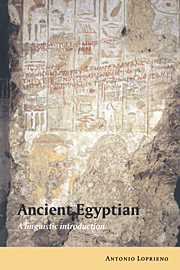Book contents
- Frontmatter
- Contents
- Preface
- Major Chronological Divisions of Egyptian History
- 1 The language of Ancient Egypt
- 2 Egyptian graphemics
- 3 Egyptian phonology
- 4 Elements of historical morphology
- 5 Nominal syntax
- 6 Adverbial and pseudoverbal syntax
- 7 Verbal syntax
- Epilogue
- Notes
- References
- Index of passages
- Index of morphemes
- Index of lexemes
- Index of topics
Preface
Published online by Cambridge University Press: 08 December 2009
- Frontmatter
- Contents
- Preface
- Major Chronological Divisions of Egyptian History
- 1 The language of Ancient Egypt
- 2 Egyptian graphemics
- 3 Egyptian phonology
- 4 Elements of historical morphology
- 5 Nominal syntax
- 6 Adverbial and pseudoverbal syntax
- 7 Verbal syntax
- Epilogue
- Notes
- References
- Index of passages
- Index of morphemes
- Index of lexemes
- Index of topics
Summary
This book is neither a grammar of Ancient Egyptian for Egyptologists nor a handbook for the study of hieroglyphs. Rather, it has been written aiming at the needs of a multiplicity of audiences. To use a fashionable word, I wanted to address the interdisciplinary interests of linguists and Egyptologists. In order to achieve this result, I had to resort to sometimes quite diverse methodological frames and scholarly conventions, which have been and are at best indifferent to each other, and at times even in overt conflict. On the one hand, the main goal of the book is to provide the linguistic audience with an introduction to the historical grammar of Ancient Egyptian, one of the oldest and longest documented languages of mankind: from its oldest (Old Egyptian) to its most recent phase (Coptic), Ancient Egyptian remained in productive written use for more than four millennia – from about 3000 BCE to the Middle Ages. On the other hand, the book also tries to reach the numerically much smaller public of Egyptologists interested in linguistic issues, i.e. my own professional milieu, offering a global presentation of the language from a structural as well as historical point of view.
Traditionally, the study of Ancient Egyptian has been the monopoly of the latter group of scholars, who operate within the discipline called “Egyptology.” In this field of scholarship, the study of the language is necessarily rooted in philology and has been mainly pursued with the aim of editing or translating Egyptian and Coptic texts.
- Type
- Chapter
- Information
- Ancient EgyptianA Linguistic Introduction, pp. xi - xiiiPublisher: Cambridge University PressPrint publication year: 1995

